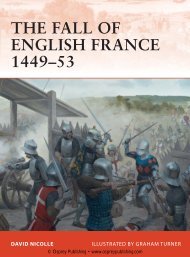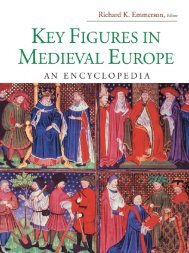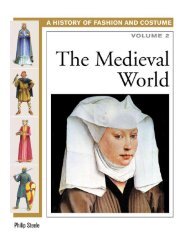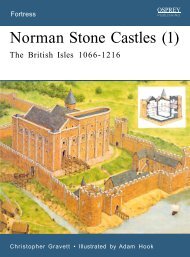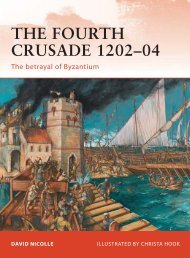Osprey - General Military - Knight - The Warrior and ... - Brego-weard
Osprey - General Military - Knight - The Warrior and ... - Brego-weard
Osprey - General Military - Knight - The Warrior and ... - Brego-weard
Create successful ePaper yourself
Turn your PDF publications into a flip-book with our unique Google optimized e-Paper software.
ill-educated <strong>and</strong> uncultured individual interested only in battle <strong>and</strong> stories of battle,<br />
this was far from the truth. A basic knowledge of Latin was probably possessed by the<br />
vast majority, if only because of their attendance of Mass at church, <strong>and</strong> a knowledge<br />
of some Latin would have been essential for a knight in the performance ot his judicial<br />
function. Similarly the ability to read <strong>and</strong> write in the vernacular (<strong>and</strong> in Engl<strong>and</strong> that<br />
meant both French <strong>and</strong> English) was also essential.<br />
When John of Salisbury writes that it was not necessary for a knight to make<br />
a declaration at the ceremony of his dubbing because 'who would require such a<br />
profession of a man who is illiterate, <strong>and</strong> who ought to be trained for arms rather than<br />
for letters?', he does not mean that the knight was unable to read <strong>and</strong> write. Instead<br />
to be litteratud in a medieval context was to be versed in classical Latin literature, to<br />
be a scholar. A medieval 'illiterate' might not be classically trained but that did not<br />
mean that he was ignorant or ill educated. Throughout this book many of our key<br />
sources have been the writings of the knights themselves: Joinville <strong>and</strong> Villehardouin's<br />
crusader narratives, Jean le Bel's account of the Weardale campaign, the poems of<br />
Bertr<strong>and</strong> du Born or the German Minnedanger, or Geoffrey de Charny <strong>and</strong> his Book<br />
of Chivalry. All are works showing a fine degree of literacy <strong>and</strong> erudition (even if<br />
Bertr<strong>and</strong> s poems do often emphasize the cruder <strong>and</strong> more bloodthirsty aspects of the<br />
knightly character).<br />
Whilst not all knights would have been capable of such literary achievements their<br />
interest in reading went further than the need to be able to comprehend a writ or<br />
compile a manorial account. John Trevisa wrote an English translation of Ralph<br />
Higden's Latin history the Polyehronicon in 1387, doing so (Trevisa tells us) because<br />
his patron, Thomas Lord Berkeley, knew some Latin but not enough to read the<br />
original in full. <strong>The</strong> knight <strong>and</strong> nobleman both collected books <strong>and</strong> read them.<br />
Most of the early vernacular narratives were tales with a distinctive epic character,<br />
emphasizing their role as entertainment, <strong>and</strong> reflecting the tastes of their readership.<br />
Wace 's two 12th-century works detailing the origins of the Duchy of Norm<strong>and</strong>y <strong>and</strong><br />
the kingdom of Britain, the Roman de Ron <strong>and</strong> Roman de Brut, are both replete with<br />
martial detail which would engage a knightly audience. William Marshal's biography,<br />
although drawn from sources close to the earl, including his son William <strong>and</strong> his long-<br />
time squire John of Earley, is written in the style of a eh<strong>and</strong>on de gedte, literally a 'song<br />
of deeds', <strong>and</strong> clearly meant to entertain as well as to praise its subject. <strong>The</strong> similarity<br />
with epic <strong>and</strong> romance tales is unsurprising. <strong>The</strong>y were all part of a longer tradition<br />
of story-telling <strong>and</strong> although they were now written down, their reading was done<br />
aloud as a group activity.<br />
<strong>The</strong> other works that the nobility collected reflect their broader cultural<br />
interests. As well as the expected works on chivalry <strong>and</strong> heraldry, religious works



